Market
Colombia Eyes Digital Assets Regulation Law
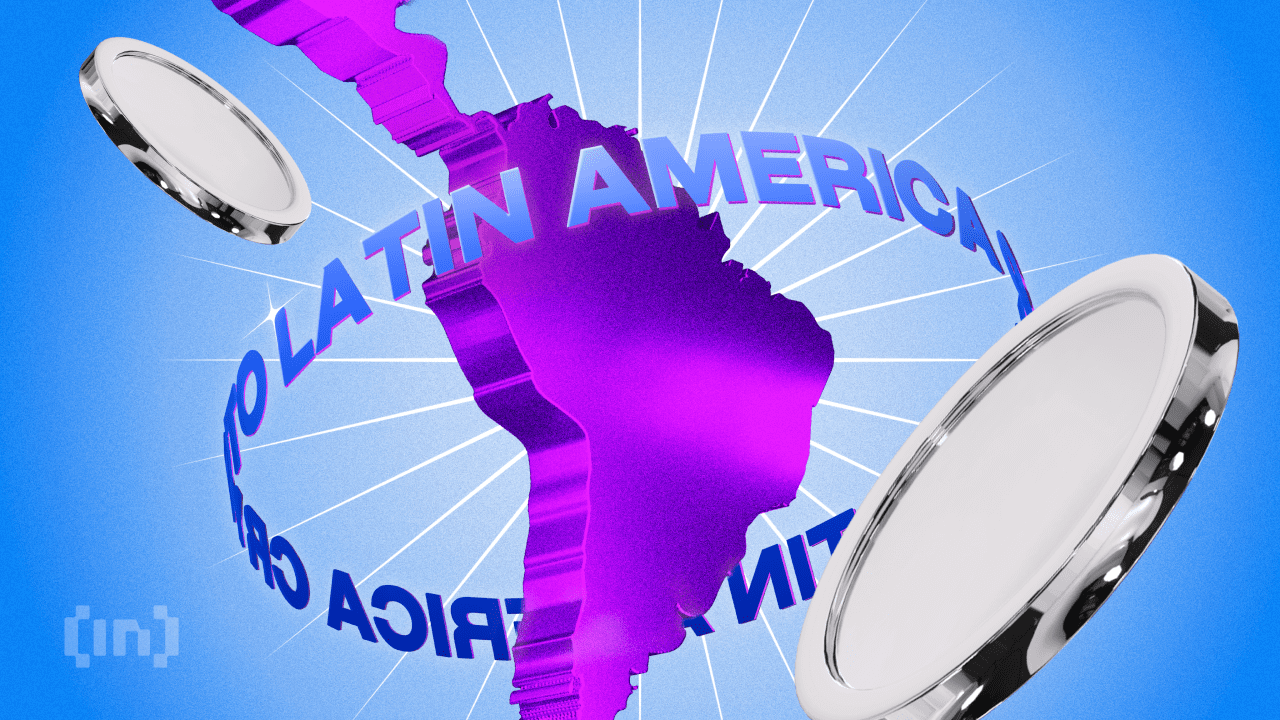
BeInCrypto comprehensive Latam Crypto Roundup brings Latin America’s most important news and trends. With reporters in Brazil, Mexico, Argentina, and more, we cover the latest updates and insights from the region’s crypto scene.
This week’s roundup includes stories on El Salvador’s plans to strengthen trade relations with Russia using Bitcoin, Binance’s survey of Latin American customers, Colombia’s efforts to develop a clear regulatory framework, and more.
Latam Investors Plan to Buy More Crypto, Says Binance
A Binance survey reveals that nearly all Latam investors intend to increase their crypto holdings in the coming year. The study interviewed around 10,000 Binance customers from Argentina, Brazil, Colombia, and Mexico. The participants, who had varying levels of investment, provided insights into their behavior and outlook on the crypto market.
According to Binance, 95% of surveyed customers plan to boost their cryptocurrency investments in the next 12 months. Of these, 42.2% expect to make purchases within the next three months, 17% within six months, and 35.7% within the year.
The research also highlighted the buying habits of investors. More than 54% purchase cryptocurrencies at least once a month. Notably, 6.6% buy more than once a day, 4.6% buy daily, 15.4% buy weekly, and 27.8% buy monthly.
When deciding which cryptocurrencies to buy, a third of the customers base their decisions on market conditions. Additionally, over 50% of the participants have been investing in cryptocurrencies for more than a year.
Read more: Best Crypto To Buy Now: Top Coins To Keep an Eye on in August 2024
The survey also explored the reasons behind their investments. Approximately 20.3% cited prospects of high profitability, 15.2% mentioned financial freedom, while 13.3% were motivated by money protection. Other reasons included innovation (12.5%), portfolio diversification (10.9%), and security and privacy (10.3%).
“Cryptocurrencies and blockchain technology offer an attractive proposition to meet concrete needs in the day-to-day lives of individuals and businesses in Latin America. With a smartphone and minimal requirements, anyone can begin to explore this world that offers lower access, costs, and transaction times. This research not only helps us to expose the current state of cryptocurrency adoption in the region but also allows us to provide insights into user behavior and expectations,” Guilherme Nazar, Binance’s regional vice president for Latin America, commented.
Worldcoin Executive Reveals Operations Without License in Ecuador
The Data Protection Superintendence of Ecuador denies receiving formal notification about Worldcoin’s operations, despite claims from Martin Mazza, regional manager for Latin America of Tools for Humanity (TFH).
For over a month, citizens in Guayaquil and Quito have had their irises scanned in exchange for cryptocurrencies via a mobile app. Users, often unaware of the terms and purposes of their biometric data usage, have received over $24 in crypto.
This raises concerns about compliance with personal data protection regulations. Fabrizio Peralta Díaz, Superintendent of Data Protection, noted the institution’s lack of resources for effective supervision, adding that he is the only official available for these duties. Peralta confirmed that contact with Worldcoin was limited to a briefing on June 17, 2024, not an official notification or request for authorization.
Read more: What Is Worldcoin? A Guide to the Iris-Scanning Crypto Project
Mazza claimed Worldcoin operates in Ecuador under a franchise model, without needing a local branch, and complies with applicable regulations, thus requiring no specific license. He stated that users can access information about the service at location centers.
The superintendence warned that if personal data processing irregularities are found, corrective measures could include ceasing data processing, as per Article 65 of the Organic Law on Personal Data Protection. However, Peralta emphasized that implementing these measures requires a technical report and due process, which are limited by the institution’s financial and human resource constraints.
JusToken Enters Brazil and Argentina
JusToken, a new global tokenization infrastructure company, is entering the real-world asset (RWA) space in Brazil and Argentina. The company aims to provide solutions in collaboration with various sector companies.
“Tokenization allows us to connect the real world with the digital world, creating a new universe of possibilities,” said JusToken’s CEO and co-founder, Eduardo Novillo Astrada. “To achieve this, a solid, scalable, and proven infrastructure that can adapt to diverse needs is essential. Justoken was born to tokenize, empower, and expand businesses. We offer solutions tailored to each industry’s needs, powered by blockchain, which gives us transparency, agility, speed, and security.”
Read more: How To Invest in Real-World Crypto Assets (RWA)?
JusToken comprises several firms, including Agrotoken, which tokenizes agricultural products; Landtoken, a farmland tokenization platform; Pectoken, a livestock tokenization platform; Enertoken, a global energy tokenization platform; and SAYKY, which offers carbon-based and ESG solutions.
The company’s goal is to convert physical assets into digital assets with liquidity and security through blockchain.
Chilean Congressman Investigated for Holding Millions in Cryptocurrency
Amid the investigation into an alleged mega-fraud involving former Maipú mayor Cathy Barriga, a new controversy has surfaced concerning her husband, Congressman Joaquín Lavín León.
Between 2018 and 2021, Lavín reportedly invested over $48 million in cryptocurrencies through the Buda.com platform. The substantial volume of these investments caught the attention of authorities, especially after the platform requested information on the origin of the funds. Lavín’s failure to respond led to the temporary blocking of his account.
Cathy Barriga’s lawyer, Cristóbal Bonacic, has defended the legitimacy of these investments, asserting that all the money in question comes from Lavín’s legitimate income. Bonacic explained that Lavín’s lack of response to the source of funds request was due to him no longer making investments on Buda.com, not due to any lack of clarity about the funds.
Read more: Complete Guide to Filing Cryptocurrency Taxes in 2024
Suspicion also surrounds a $12,600 transaction made in September 2018 by Vicente González, Barriga’s eldest son. Vicente, who was 19 at the time, made the transaction from his Buda.com account before he began his relationship with the Internal Revenue Service.
Neither Cathy Barriga nor Joaquín Lavín have made additional statements. Bonacic concluded that there is no objection to the Public Prosecutor’s Office investigating thoroughly, maintaining that there has been no irregular or illegal action in the context of these investments.
El Salvador Willing to Pay Russia in Bitcoin for Bilateral Business
El Salvador, having already legalized Bitcoin as legal tender, is now prepared to use cryptocurrencies for trade with Russia. Alexander Ilyukhin, first secretary of the Russian Embassy in Nicaragua and head of the branch in El Salvador, announced this during an interview with local media outlet Izvestia.
Given that El Salvador’s official currency is the US dollar, Ilyukhin mentioned that the country faces challenges with payments. To address these issues, El Salvador proposes that Russia adopt cryptocurrencies for transactions.
This initiative symbolizes a move toward alternative international payment methods amid sanctions and restrictions. However, the practical benefits of such declarations are often negligible, even if implemented.
Read more: Who Owns the Most Bitcoin in 2024?
In recent years, El Salvador and Russia have been strengthening trade relations. At the St. Petersburg International Economic Forum, El Salvador’s Vice President Felix Uyoa confirmed a commitment to expand trade ties with Russia, especially with innovation-driven companies. Russian Foreign Minister Sergei Lavrov also noted the potential for increased trade, emphasizing the need for direct contacts between the business communities of both countries.
Despite these efforts, current trade volumes between the nations are minimal. In the fourth quarter of 2023, Russia exported goods worth approximately $1 million to El Salvador, while imports from El Salvador did not exceed $20,000. El Salvador mainly exports coffee and its substitutes to Russia, while Russia supplies fertilizers and machinery to El Salvador.
Google and Itaú Brazil Integrate Central Bank Digital Payments
On July 30, Google announced the integration of Pix, Brazil’s instant payment system, into its digital wallet. This new feature aims to simplify transactions, allowing users to make payments and transfers quickly and securely without needing to open their bank’s app.
To enable this integration, Google obtained a specific payment indicator license from the Central Bank. Users can now add their Pix keys to Google Wallet, making payments at merchants and online stores that accept Pix. Additionally, they can send and receive money from friends and family instantly, 24/7.
Google Pay, the tech giant’s platform for online and contactless payments, will ensure transaction security with encryption and two-factor authentication. Google highlights that Pix in Google Wallet offers a convenient way to make payments without cash or cards.
Read more: Crypto vs. Banking: Which Is a Smarter Choice?

The functionality will launch gradually, initially available only to C6 Bank and PicPay customers. Elisa Jóia, Google’s head of payments operations for Latin America, stated that this first stage aims to test the functionality and gather user feedback.
“The idea is to do a small launch, so we can understand what the user feedback will be like, to ensure as much security as possible,” Jóia said.
Integrating Pix into Google Wallet will create a fully digital wallet, offering users the choice between credit, debit, and Pix. With the popularity of Google’s digital wallet and Pix’s wide acceptance, this new feature has the potential to drive financial inclusion and simplify transactions for millions of Brazilians.
Colombian Banks and Regulators Consider Cryptocurrency Law
Colombia is positioning itself as a leader in crypto adoption in Latam but faces significant regulatory challenges concerning cryptocurrencies and digital assets. To address these issues, banking entities are pushing for regulations that would make the Colombian Financial Superintendency’s Sandbox more practical and extensive.
Despite the absence of a clear regulatory framework, local media such as Portafolio report that Colombian financial institutions are advancing in their integration of cryptocurrencies. Bancolombia, Davivienda, and Itaú have begun to develop their own exchange platforms despite regulatory uncertainties. For instance, Bancolombia has launched Wenia, a platform designed to facilitate cryptocurrency transactions, backed by a stablecoin pegged to the Colombian peso.
Davivienda has demonstrated its technological capabilities and is awaiting a more mature regulatory environment to fully enter the crypto market. However, these initiatives face the obstacle of an unstable regulatory framework. The recent LaArenera ‘sandbox’ stage, created by the Superintendencia Financiera to test new technologies in a controlled environment, highlighted the limitations of the current regulations.
Read more: Crypto Regulation: What Are the Benefits and Drawbacks?
Although the pilot involved alliances like Banco de Bogotá with Bitso and Davivienda with Binance, progress toward widespread cryptocurrency adoption remains slow.
As the Latam crypto scene grows, these stories highlight the region’s increasing influence in the global market. Stay tuned for more updates and insights in next week’s roundup.
Disclaimer
In adherence to the Trust Project guidelines, BeInCrypto is committed to unbiased, transparent reporting. This news article aims to provide accurate, timely information. However, readers are advised to verify facts independently and consult with a professional before making any decisions based on this content. Please note that our Terms and Conditions, Privacy Policy, and Disclaimers have been updated.
Market
Report Alleges Massive Meme Coin Sniping on Pump.fun

According to a new report from Pine Analytics, token deployers on Pump.fun systematically funded sniper wallets to buy their own meme coins. This impacted over 15,000 token launches on the platform.
These sniper wallets operated primarily during US trading hours, executing standardized, profitable strategies. Unrelated bot activity obscures their behavior, making it extremely difficult to isolate these wallets—and they can readily adapt to new countermeasures.
Snipers Roam Free on Pump.fun Meme Coins
Pump.fun has remained one of the most popular meme coin launchpads on Solana despite persistent controversies and other criticism.
However, Pine Analytics’ new report has uncovered a new controversy, discovering systematic market manipulation on the platform. These snipes include as much as 1.75% of all launch activity on Pump.fun.
“Our analysis reveals that this tactic is not rare or fringe — over the past month alone, more than 15,000 SOL in realized profit was extracted through this method, across 15,000+ launches involving 4,600+ sniper wallets and 10,400+ deployers. These wallets demonstrate unusually high success rates (87% of snipes were profitable), clean exits, and structured operational patterns,” it claimed.
Solana meme coin deployers on Pump.fun follow a consistent pattern. They fund one or more sniper wallets and grant them advance notice of upcoming token launches.
Those wallets purchase tokens in the very first block and then liquidate almost immediately—85% within five minutes and 90% in just one or two swap events.

Pump.fun meme coin developers exploit this tactic to create the appearance of immediate demand for their tokens. Retail investors, unaware of the prior sell‑off, often purchase these tokens after the snipe, giving developers an unfair advantage. This constitutes market manipulation and erodes trust in the platform.
Pine Analytics had to carefully calibrate its methods to identify genuine snipers. Apparently, 50% of meme coin launches on Pump.fun involve sniping, but most of this is probably bots using the “spray and pray” method.
However, by filtering out snipers with no direct links to developer wallets, the firm missed projects that covered their tracks through proxies and burners.
In other words, the meme coin community does not have adequate defenses against systematic abuse on Pump.fun. There are a few possible ways that the platform could flag repeat offenders and sketchy projects, but adaptive countermeasures could defeat them. This problem demands persistent and proactive action.
Unfortunately, it may be difficult to enact such policies. Meme coin sniping is so systematic that Pump.fun could only fight it with real commitment.
Analysts think that building an on-chain culture that rewards transparency over extraction is the best long-term solution. A shift like that would be truly seismic, and the meme coin sector might not survive it.
Disclaimer
In adherence to the Trust Project guidelines, BeInCrypto is committed to unbiased, transparent reporting. This news article aims to provide accurate, timely information. However, readers are advised to verify facts independently and consult with a professional before making any decisions based on this content. Please note that our Terms and Conditions, Privacy Policy, and Disclaimers have been updated.
Market
Solana Leads Blockchain Metrics as SOL Momentum Builds

Solana (SOL) continues to show strength across multiple fronts, maintaining a bullish structure on its Ichimoku Cloud chart while gaining momentum in key market metrics. The BBTrend indicator has turned higher again, signaling renewed buying pressure after a brief cooldown.
On-chain activity remains strong, with Solana leading all blockchains in DEX volume and dominating fee generation thanks to the explosive growth of meme coins and launchpad activity. With SOL now trading above a key resistance level, the path is open for further upside—though a loss of momentum could still trigger a retest of lower supports.
Solana Maintains Bullish Structure, but Momentum Faces Key Test
On Solana’s Ichimoku Cloud chart, the price is currently above the Kijun-sen (red base line) but has dipped below the Tenkan-sen (blue conversion line), signaling weakening short-term momentum.
The flattening Tenkan-sen and price behavior suggest possible consolidation or the early stages of a pullback. Still, with the price holding above the Kijun-sen, medium-term support remains intact.
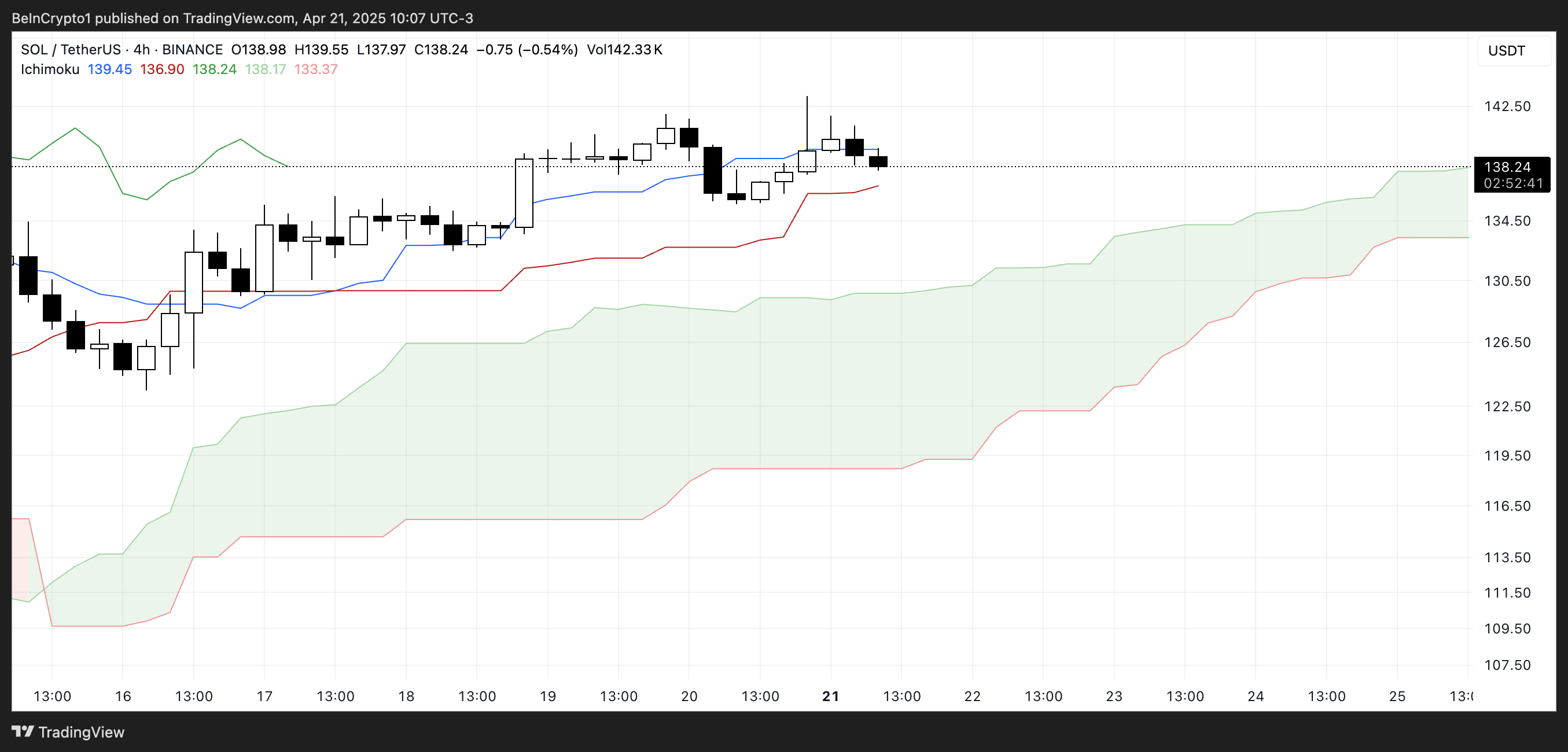
The overall Ichimoku structure remains bullish, with a thick, rising cloud and leading span A well above span B—indicating strong underlying support.
If Solana finds support at the Kijun-sen and climbs back above the Tenkan-sen, the uptrend could regain strength; otherwise, a test of the cloud’s upper boundary may follow.

Meanwhile, Solana’s BBTrend is currently at 6, extending nearly ten days in positive territory after peaking at 17.5 on April 14. The recent increase from 4.26 to 6 suggests renewed bullish momentum following a brief cooldown.
BBTrend, or Bollinger Band Trend, tracks the strength of price movement based on Bollinger Band expansion.
Positive values like the current one point to an active uptrend, and if the BBTrend continues to rise, it could signal stronger momentum and potential for another upward move.
Solana Dominates DEX Volume and Fee Generation as Meme Coins Drive Ecosystem Growth
Solana has once again claimed the top spot among all chains in DEX volume, recording $15.15 billion over the past seven days. The combined total of Ethereum, BNB, Base, and Arbitrum reached $22.7 billion.

In the last 24 hours alone, Solana saw $1.67 billion in volume, largely fueled by its booming meme coin ecosystem and the ongoing launchpad battle between PumpFun and Raydium. Adding to this good momentum, Solana recently surpassed Ethereum in Staking Market Cap.

When it comes to application fees, Solana’s momentum is just as clear. Four of the top ten fee-generating apps over the past week—PumpFun, Jupiter, Jito, and Meteora—are Solana-focused.
Pump leads the pack with nearly $18 million in fees alone.
Solana Breaks Key Resistance as Uptrend Targets Higher Levels, but Risks Remain
Solana has finally broken above its key resistance at $136, flipping it into a new support level that was successfully tested just yesterday.
Its EMA lines remain aligned in a bullish setup, suggesting the uptrend is still intact.
If this momentum continues, SOL price could aim for the next resistance zones at $147 and $152—levels that, if breached, open the door to a potential move toward $179.
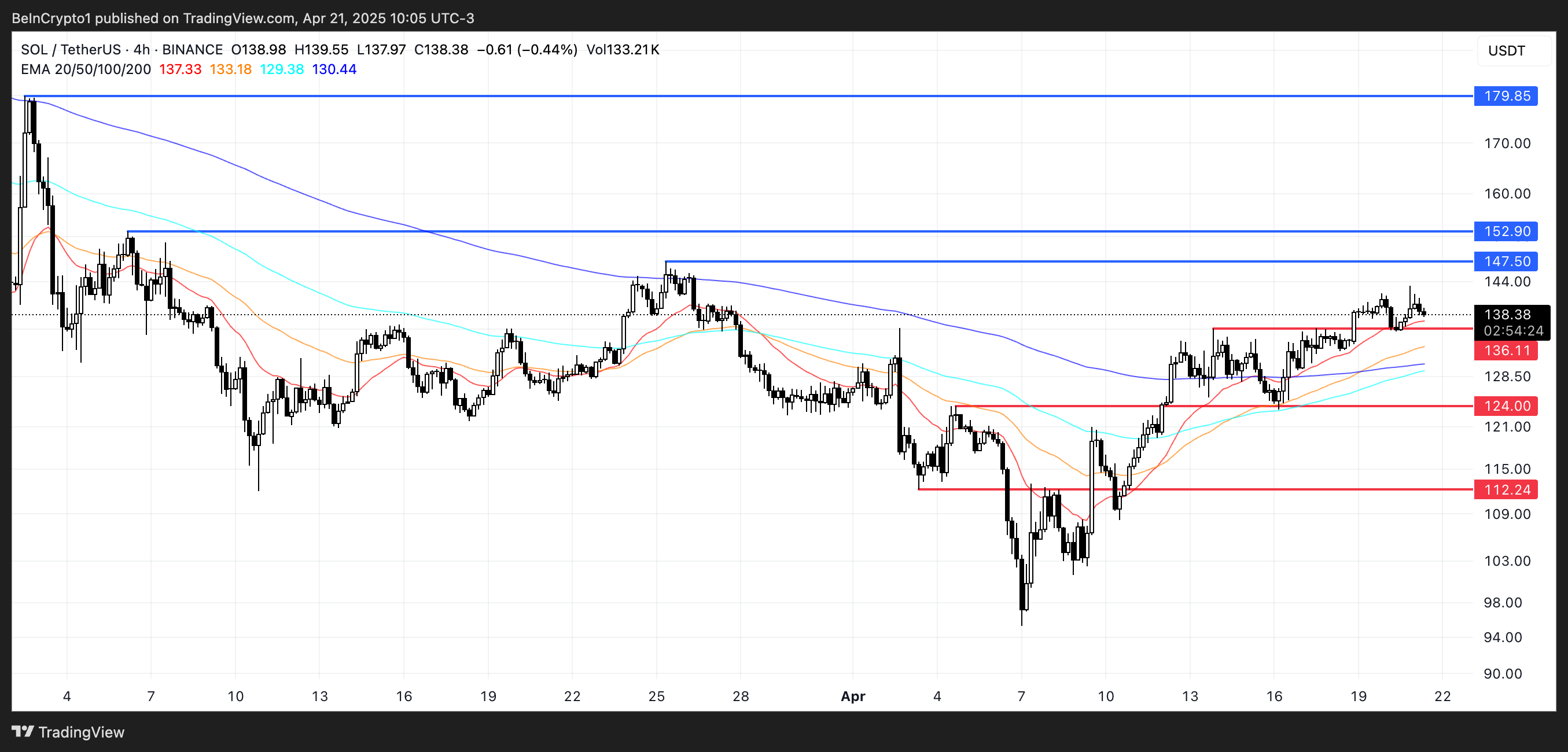
The current structure favors buyers, with higher lows and strong support reinforcing the trend.
However, if momentum fades, a retest of the $136 support is likely.
A breakdown below that level could shift sentiment, exposing Solana to deeper pullbacks toward $124 and even $112.
Disclaimer
In line with the Trust Project guidelines, this price analysis article is for informational purposes only and should not be considered financial or investment advice. BeInCrypto is committed to accurate, unbiased reporting, but market conditions are subject to change without notice. Always conduct your own research and consult with a professional before making any financial decisions. Please note that our Terms and Conditions, Privacy Policy, and Disclaimers have been updated.
Market
Crypto Firms Donated $85 million in Trump’s Inauguration
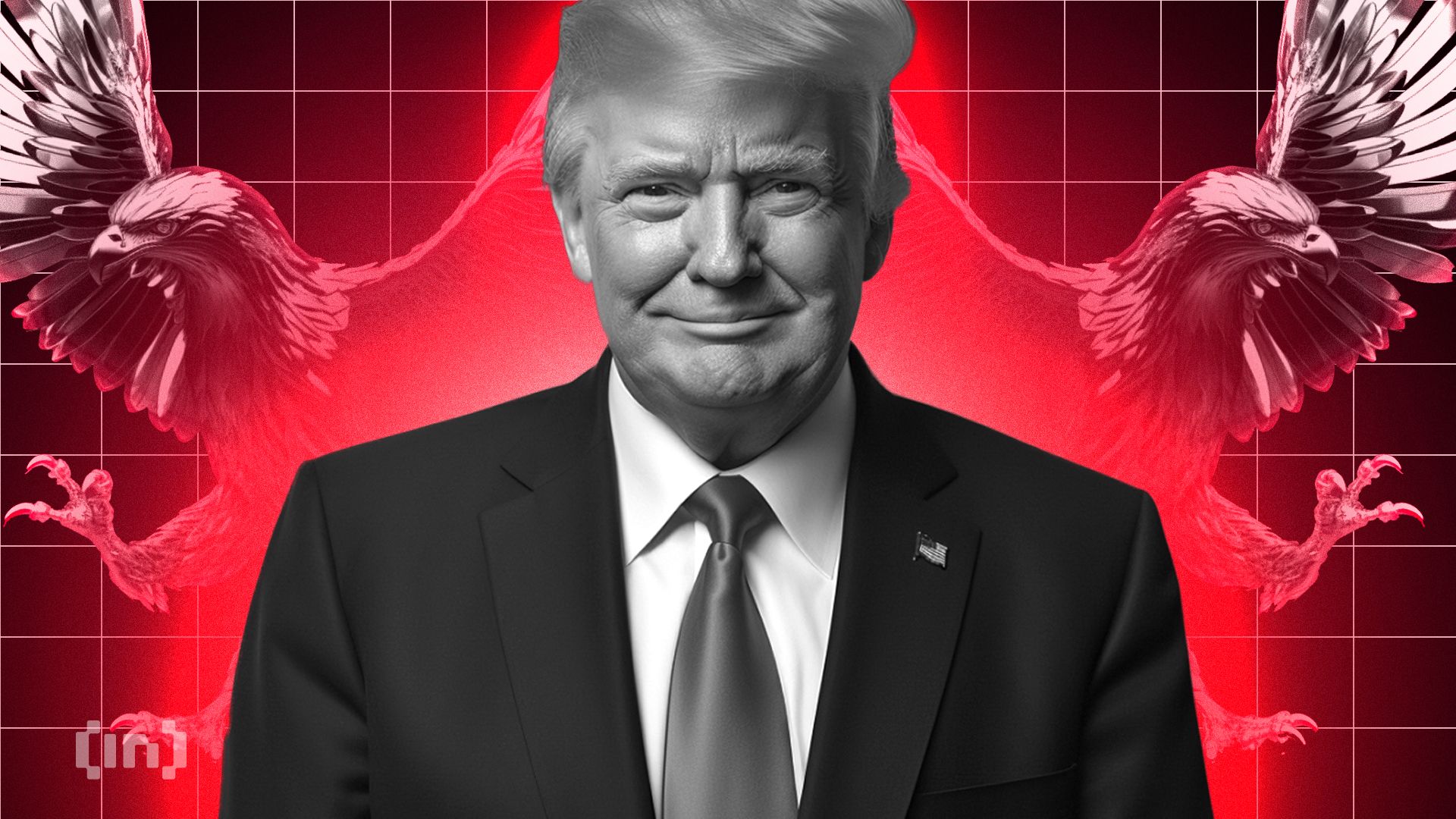
According to a new report, 15 firms and individuals from the crypto industry donated more than $100,000 to President Trump’s Inauguration, totaling over $85 million.
Almost all of these companies apparently received direct or indirect benefits from Trump’s administration. This includes dropped legal proceedings, lucrative business partnerships, participation in Trump’s Crypto Summit, and more.
Crypto Industry Went All-In on Trump’s Inauguration
Since promising to bring friendlier regulations on the campaign trail, Donald Trump attracted a reputation as the Crypto President.
Trump’s Inauguration festivities included a “Crypto Ball,” and several prominent firms made donations for these events. Today, a report has compiled all crypto-related contributions of over $100,000, revealing some interesting facts.

Since taking office, President Trump and his family have been allegedly involved in prominent crypto controversies, and these donations may be linked to several of them.
For example, eight of the donors, Coinbase, Crypto.com, Uniswap, Yuga Labs, Kraken, Ripple, Robinhood, and Consensys, had SEC investigations or lawsuits against them closed since Trump’s term began.
The commission might have dropped its probe against these companies anyway due to its changing stance on crypto enforcement. However, being in the President’s good books likely helped the process.
Further Alleged Benefits for Donors
In other words, nearly half the firms that made donations to Trump’s Inauguration have seen their legal problems cleared up quickly. This isn’t the only regulation-related benefit they allegedly received.
Circle, for example, recently made an IPO after openly stating that Trump’s Presidency made it possible. Galaxy Digital received SEC approval for a major reorganization, a key step for a NASDAQ listing.
Other donors, such as Crypto.com and ONDO, got more direct financial partnerships with businesses associated with the Trump family.
Previously, Ripple’s CEO, Brad Garlinghouse, anticipated a crypto bull market under Trump. Also, XRP, Solana, and Cardano were all unexpectedly included in the US Crypto Reserve announcement.
All three of these companies made major donations to Trump’s Inauguration.
It seems that most of the firms involved got at least some sort of noticeable benefit from these donations. Donors like Multicoin and Paradigm received invitations to Trump’s Crypto Summit, while much more prominent groups like the Ethereum Foundation got snubbed.
Meanwhile, various industry KOLs and community members have already alleged major corruption in Trump’s crypto connections.
While some allegations might lack substantial proof, the crypto space has changed dramatically under the new administration, for both good and bad.
Disclaimer
In adherence to the Trust Project guidelines, BeInCrypto is committed to unbiased, transparent reporting. This news article aims to provide accurate, timely information. However, readers are advised to verify facts independently and consult with a professional before making any decisions based on this content. Please note that our Terms and Conditions, Privacy Policy, and Disclaimers have been updated.
-

 Altcoin22 hours ago
Altcoin22 hours agoWill Cardano Price Break Out Soon? Triangle Pattern Hints at 27% ADA Surge
-

 Ethereum19 hours ago
Ethereum19 hours agoEthereum Analyst Sets $3,000 Target As Price Action Signals Momentum – Details
-

 Market18 hours ago
Market18 hours agoHow Will it Impact OM Price?
-

 Market22 hours ago
Market22 hours agoBNB Springs Back From $531 With Unshaken Bullish Conviction
-
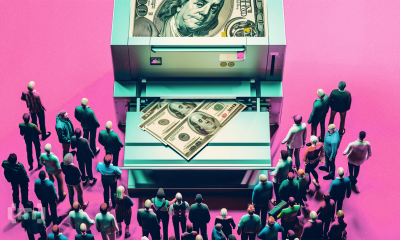
 Market21 hours ago
Market21 hours agoCircle, BitGo, and Others Eye Bank Charters in US
-
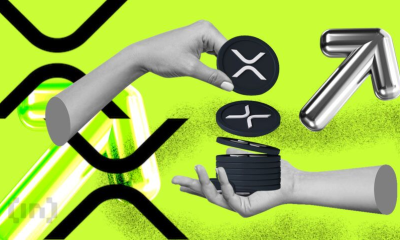
 Market23 hours ago
Market23 hours agoXRP Futures Traders Increase Bets on Upside
-
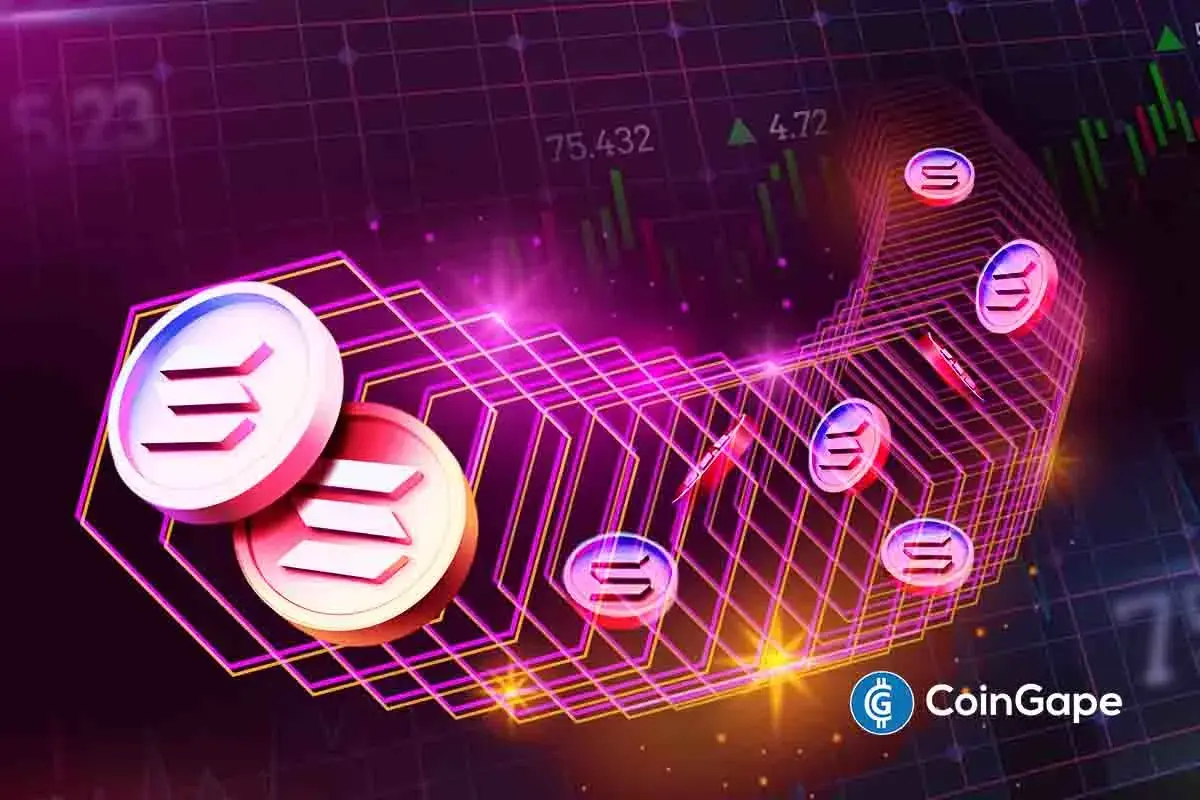
 Altcoin21 hours ago
Altcoin21 hours agoTop Solana Price Levels to Watch in the Short Term
-
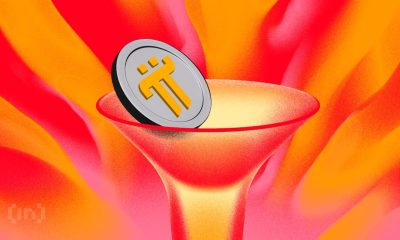
 Market20 hours ago
Market20 hours agoPI Token Price Faces Bearish Pressure, Risking a Drop to $0.40

























